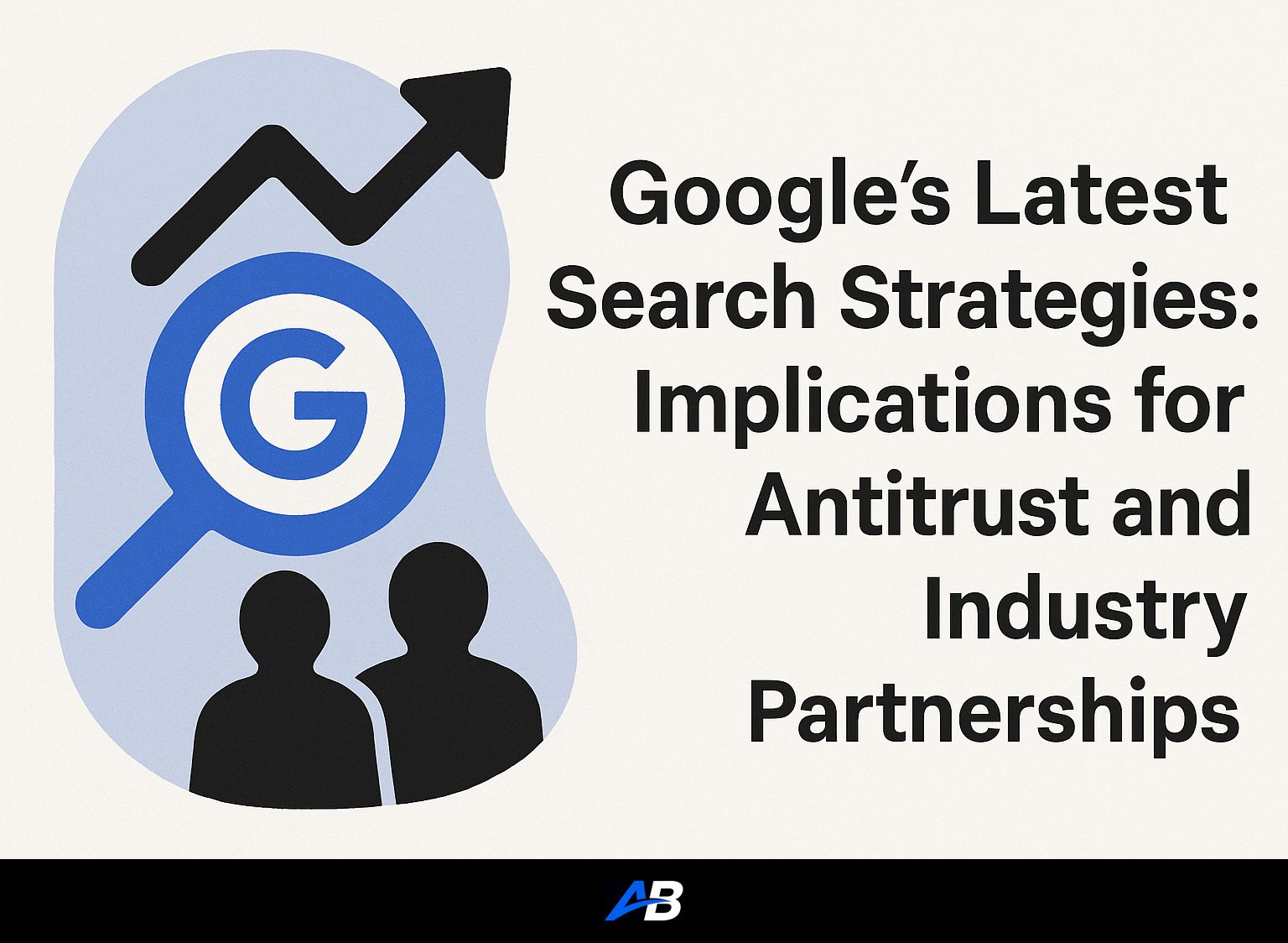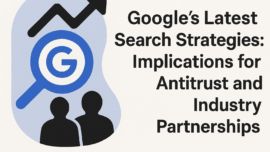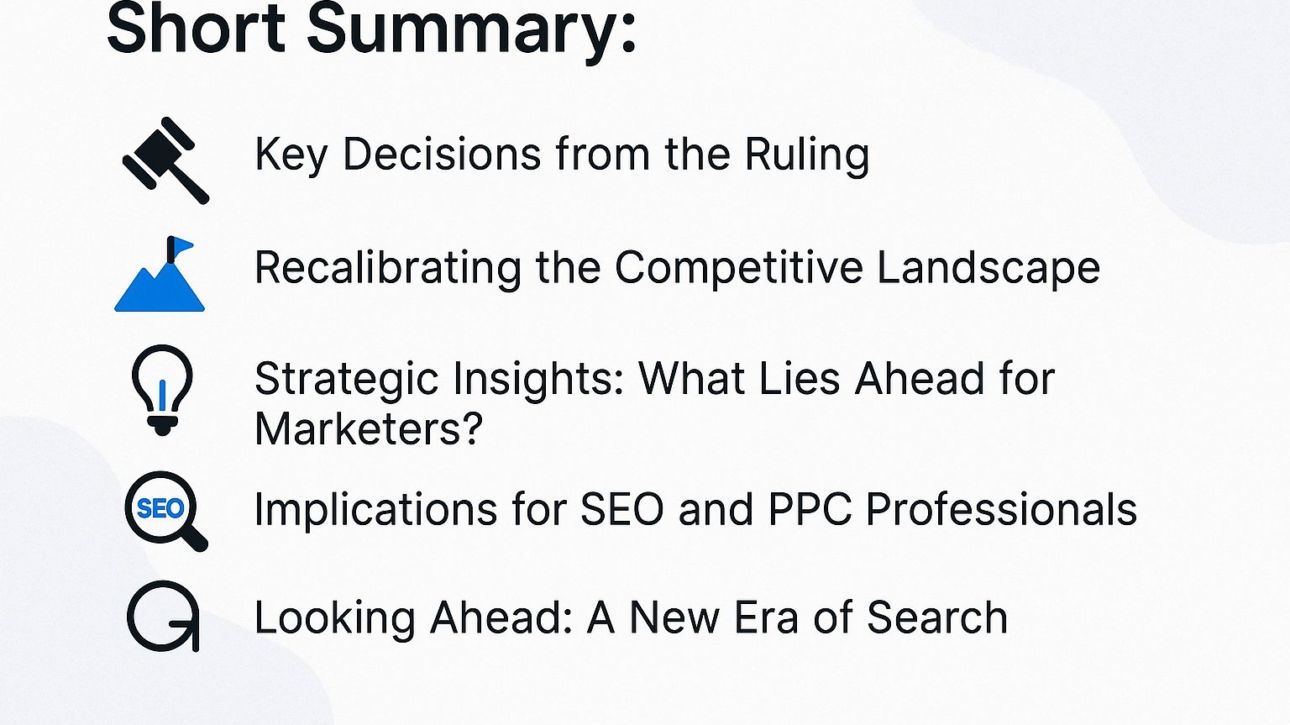The recent antitrust ruling against Google marks a significant turning point in the tech industry, reshaping competition in search engines and AI while challenging conventional SEO norms.
Contents
Short Summary:
- Google is required to share certain search data with selected competitors.
- The ruling avoids breaking up Google but revamps its contract practices.
- Marketers must adapt their SEO strategies to reflect the evolving landscape influenced by AI and changing user behaviors.
On September 2, 2025, U.S. District Judge Amit P. Mehta issued a landmark ruling in the long-standing antitrust lawsuit against Google, defining the future of search engines and their interplay with artificial intelligence (AI). This case, initiated by the Department of Justice (DOJ) and a coalition of states in 2020, challenged Google’s alleged monopoly over the search market through exclusionary contracts and substantial payment schemes. Many anticipated a radical breakup of Google’s core services, particularly its Chrome browser and Android operating system, but the court opted for behavioral remedies instead, driving home the message that competition can thrive under new operating conditions.
Judge Mehta bluntly stated, “Google is a monopolist, and it has acted as one to maintain its monopoly.” Yet, rather than enforcing a breakup, the ruling emphasizes transparency and provides a framework for increased competition among search engines.
Key Decisions from the Ruling
Judge Mehta’s ruling incorporates several pivotal changes to Google’s operating framework:
- Ban on Exclusive Contracts: Google can no longer enter into agreements that establish it as the exclusive default search engine for major tech platforms, including Apple and Samsung. This opens new avenues for competitors such as Microsoft Bing and emergent AI-driven search technologies to become default options.
- Continued Payments for Placement: While Google retains the ability to make payments for default arrangements, these agreements must no longer be exclusive. Judge Mehta indicated that eliminating payments entirely would harm distribution partners, prompting a balance between partnerships and competition.
- Data Sharing Mandate: The ruling compels Google to share specific portions of its search index and certain user interaction data with designated “qualified competitors,” although advertising data remains excluded. This transparency could significantly empower new players in the search market.
- Duration of Oversight: Compliance with these remedies will be monitored by a technical committee over the next six years, with a revised judgment expected on September 10, 2025, and implementation starting roughly 60 days thereafter.
Recalibrating the Competitive Landscape
This ruling not only alters Google’s operations but also has far-reaching implications for SEO and marketing strategies. Investors celebrated the decision, as evidenced by an approximately 8% increase in Alphabet’s stock price, reflecting relief that the company’s core business structure remained primarily intact.
The new ruling hints at a significant shift in market dynamics, transitioning from Google’s protective moat to a more competitive environment. The ruling’s implications will directly influence how businesses approach their digital marketing strategies moving forward.
Strategic Insights: What Lies Ahead for Marketers?
The ramifications of this ruling extend well beyond the courtroom, presenting new opportunities and challenges for marketers:
- Transforming from Moats to Marketplaces: The removal of exclusivity in default search positions erodes Google’s previous protective barriers, effectively transforming search into a competitive marketplace. For instance, Google reportedly paid Apple $20 billion to remain Safari’s default search engine last year, which could change as Apple opens its doors to other competitors.
- Data Availability Fuels Competition: By mandating Google to share parts of its search index, the ruling could catalyze a new wave of challengers, including traditional search engines like Bing and innovative AI-powered platforms. Ada’s definition of ‘qualified competitors’ will be crucial, determining how many new players emerge and how efficiently they can harness this advantageous data.
- AI Remains the Game-Changer: The court recognized generative AI’s impact on search and emphasized the need for new content strategies. With AI-powered tools like ChatGPT and Perplexity gaining traction, content creators must pivot to focus on crafting ‘assistant-ready’ materials that AI tools can utilize efficiently. If these assistants become the primary information sources, SEO strategies must adjust to prioritize context and relevancy over traditional SERP rankings.
- Financial Dynamics Are Changing: While the initial ruling brought joy to investors, the long-term ramifications could mean increased operational costs for Google. As new competitors vie for default status on devices, Google’s traffic acquisition costs may rise, leading to pressure on their profit margins.
- The Ad-Tech Front: Another Battle: Beyond this antitrust case, the DOJ continues to pursue separate litigation against Google’s advertising technology structure. Breaking up this side of their operations could radically alter how search advertisements are bought, measured, and monetized, impacting marketers and publishers alike.
Implications for SEO and PPC Professionals
As the search landscape transforms, SEO and PPC professionals need to adapt their strategies accordingly:
- Embrace Volatility in Distribution: As traditional search defaults become more competitive, marketers should budget for increased variability in their search engine marketing efforts and consider diversifying their advertising models.
- Optimize for AI Efficiency: It is essential to produce succinct, citation-worthy content that resonates with AI-driven tools. Content must be optimized with schema markup and tailored presentations to maximize visibility through new AI platforms.
- Diversify Search Strategies: Taking advantage of any index-sharing initiatives will require marketers to seek partnerships with emerging search engines and explore novel alignment with user trends.
- Enhance Attribution Standards: As AI assistants increasingly mediate traffic, bolstering tracking methods and governance will be critical for accurately assessing marketing performance.
- Innovate Content Formats: Marketers should develop dual-content structures to cater to both AI platforms and human audiences, balancing the need for depth and conciseness effectively.
Looking Ahead: A New Era of Search
The future of search is becoming intricately linked to the evolution of AI technologies, setting the stage for a broader transformation within the digital marketing landscape. Judge Mehta aptly characterized the challenge before the courts, stating, “Courts must craft remedies with a healthy dose of humility.” While the balance of power is shifting, it may not do so abruptly; nonetheless, this ruling signals a new competitive era.
Marketers must remain vigilant, leveraging the latest advancements—including AI-generated insights and platforms like Autoblogging.ai—to navigate this complex, rapidly evolving landscape. The real competition for user engagement and visibility is just beginning, and proactive adaptation will be essential for sustained success in this new SEO era.
Do you need SEO Optimized AI Articles?
Autoblogging.ai is built by SEOs, for SEOs!
Get 30 article credits!



